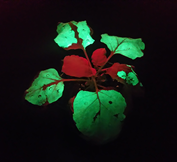・Viral vectors or deconstructed viral vector strategies result in enhanced recombinant protein yield, high throughput, and scalability.
・We have developed the “Tsukuba system” in which the expression level of the green fluorescent protein (GFP) is much faster than the existing transient expression systems.
・We have also found not only to increase the yield of proteins, optimization of codon usage is recommended for transient expression, but also to prevent necrosis using a foliar spray application with high concentrations of ascorbate due to overexpression of recombinant proteins in plant cells.
Abstract
Transient protein expression in plant cells is less time-consuming than the production of whole transgenic plants. For transient expression, agroinfiltration is a simple and effective method to deliver transgenes into plant cells. After an Agrobacterium infection, recombinant proteins can be produced in plant cells from 3 to 10 days. To increase protein yield, a deconstructed viral vector has been used. We established a high expression system, named “Tsukuba system” and by using this system, recombinant GFP protein was produced at the yield of ~4 mg/g fresh weight for 3 days in Nicotiana benthamiana. The combination of a geminiviral replication and a double terminator dramatically enhanced the recombinant protein expression level in plants. Furthermore, the system can be applied to several plant species, such as lettuce, tomatoes, eggplants, peppers, melons, orchids as well as Nicotiana benthamiana.
Benefit
Using the Tsukuba system, recombinant proteins can be produced more and faster than the conventional expression platforms.
Market Application
The recombinant proteins are used as medical diagnostic reagents in humans healthcare; vaccines, drugs, or antibodies, as well as in biochemical analysis. i.e., cytokines, and growth regulators.
Publications
https://www.sciencedirect.com/science/article/pii/S0076687921001804
IP
Date: Mar 6th, 2018
Number: US2021108218
Status: Filed
URL:https://worldwide.espacenet.com/publicationDetails/biblio?FT=D&date=20210415&DB=&locale=jp_EP&CC=US&NR=2021108218A1&KC=A1&ND=4#
Other
https://pubmed.ncbi.nlm.nih.gov/32300351/
https://pubmed.ncbi.nlm.nih.gov/33013955/


